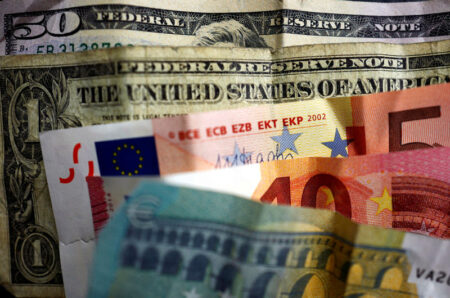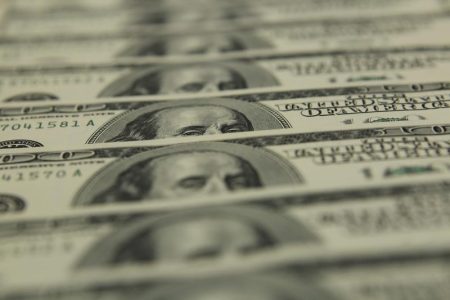By Herbert Lash and Samuel Indyk
NEW YORK/LONDON (Reuters) -The dollar rose on Thursday after data on unemployment benefits again pointed to a resilient U.S. labor market, reinforcing the Federal Reserve’s message that interest rates are unlikely to be cut in the near term.
The number of Americans filing new claims for unemployment benefits fell more than expected last week, the latest sign of labor market strength despite a recent spike in layoffs.
Initial claims for state unemployment benefits dropped 9,000 to a seasonally adjusted 218,000 for the week ended Feb. 3, the Labor Department said, less than the 220,000 forecast by economists polled by Reuters.
The initial claims data still points to a robust U.S. labor market that has kept the dollar strong, said Thierry Wizman, global FX and interest rates strategist at Macquarie in New York.
“The problem here is that we continue to get positive surprises in the U.S. and we’re not getting enough positive surprises in the rest of the world, and certainly not in China,” he said.
“If the dollar is going to weaken, we’re going to need to see some attenuation of the robustness in the U.S. data and some improvement in the data in Europe and China,” he said. “When’s that going to happen? Very, very hard to say.”
The next major scheduled U.S. data release is January’s Consumer Price Index (CPI) reading of inflation on Feb. 13.
Expectations for U.S. central bank rate cuts by year end have been slashed to 115 basis points (bps) from 140 bps just before the release of last Friday’s blowout jobs report, trading in Fed funds futures show.
The likelihood of a rate cut in March slipped one-half percentage point from Wednesday to 18.5%, but was about half expectations of 36.5% a week ago, according to CME Group’s (NASDAQ:) FedWatch Tool.
The was last up 0.14% at 104.16, after hitting 104.43 following the initial claims report. The euro rebounded from a low of 1.074, gaining 0.02% to $1.0773.
Higher Treasury yields also have bolstered the dollar, particularly against lower-yielding currencies, such as the yen.
The two-year Treasury yield, which reflects interest rate expectations, rose 3.4 basis points to 4.456% and the 10-year yield was up 7 basis points at 4.168%.
The yen was down about 0.82% versus the greenback at 149.380. It slipped to 149.46 after the initial claims data, its weakest level since Nov. 27.
Bank of Japan Deputy Governor Shinichi Uchida said overnight that the central bank was unlikely to raise interest rates aggressively, even after exiting negative interest rates.
Sterling was down 0.11% at $1.2613.
The yuan held steady despite data that showed China’s consumer prices fell at their steepest pace in more than 14 years in January.
CPI fell 0.8% from a year earlier, but rose 0.3% month-on-month. Economists polled by Reuters had forecast a 0.5% fall year-on-year and a 0.4% gain month-on-month.
The offshore Chinese yuan rose 0.05% to $7.2159 per dollar, while the rose 0.03% to $7.1965.
rose 2.73% to $45,396.44, the first time it has risen above $45,000 since Jan. 12.
Read the full article here












